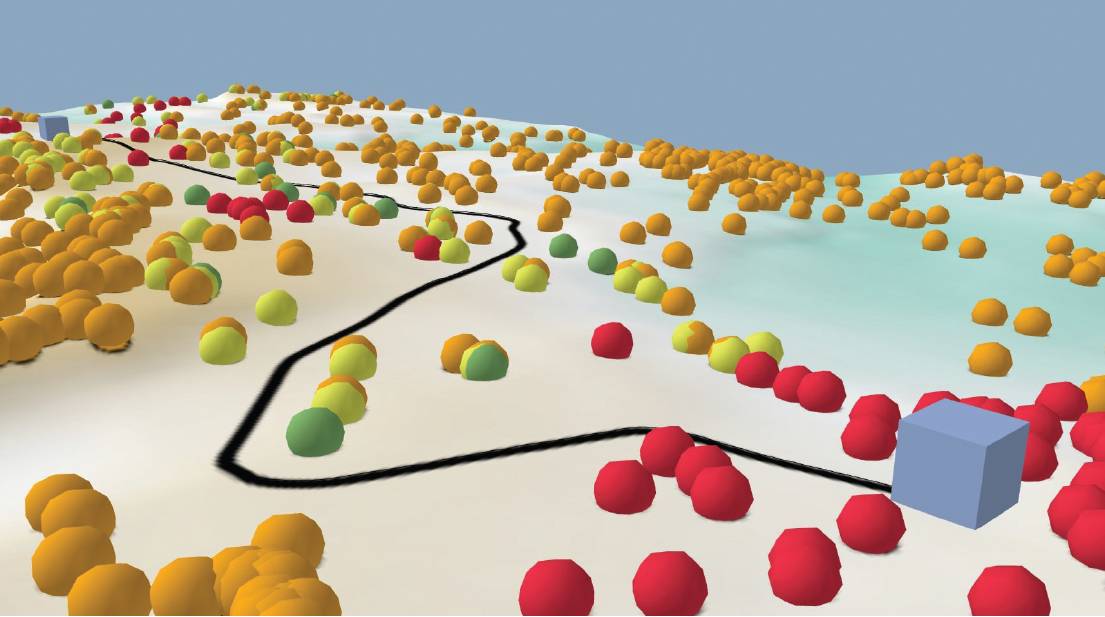
A US university is partnering with industry to teach statistical and machine learning techniques for subsurface geo-data.
Fugro has joined the University of Houston on the Data Science for the Energy Transition programme funded by a three-year grant from the National Science Foundation.
The university will offer undergraduate and master’s students training in geodata science applied to renewable energy sources, including offshore wind.
Fugro recently developed a machine learning solution for mapping boulder fields from seafloor data to identify and analyse thousands of boulders (right) to accelerate site investigation.
Jason Smith, Fugro’s global director for geo-data analysis and geoconsulting, commented: “As a UH alumnus,
I look forward to the partnership’s contribution toward a safe and liveable world. Conventional and renewable energy development benefits from more automated application of geodata.”
The Alan Turing Institute, British Standards Institution (BSI) and National Physical Laboratory (NPL) are to pilot a new UK government initiative to shape global technical standards for artificial intelligence.
The new AI Standard Hub aims to create practical tools for businesses, bring the UK’s AI community together through a new online platform, and develop educational material. Part of the UK’s National AI Strategy, the hub comes as new research has found more than 1.3 million UK businesses will use AI by 2040 and spending on AI is expected to reach more than £200bn by the same date.
Adrian Smith, chief executive of The Alan Turing Institute, said: “International standards are set to play an increasingly crucial enabling role in the adoption and effective governance of AI technologies. We look forward to working closely with our partners in establishing the AI Standards Hub, leveraging our expertise and networks to build and engage an inclusive, multi-stakeholder community around AI standardisation.”
Total staff numbers at construction consultancy firms are down 4.2% at larger firms and 17.4% at SMEs since the start of the COVID-19 pandemic. The figures come from the Association for Consultancy and Engineering’s (ACE) annual benchmarking study and reflect the way the sector has adapted to the uncertainty of the last 24 months.
Revenue growth is down for both large companies (1.7%, from 6.3% in 2019) and SMEs (1.3%, down from 3.4% in 2019), but overhead and operating expenses dropped to 17.9% for large consultancies and 19% for SMEs as companies looked for efficiencies.
Commenting on the findings, Laurence Brett, interim CEO at ACE said: “We have been through a challenging period. Despite this, we must recognise that we have fared well compared to more public-facing areas of the economy. Even with this uncertainty, our sector still registered revenue growth. Looking ahead, there is plenty for us to be positive about. Not just in terms of the pandemic in 2022, but through the added clarity that the recent publication of the Construction and Infrastructure Pipeline and Integrated Rail Plan have recently brought us.”

Over 40 archaeologists are working at sites along the UK’s A66 hoping to understand more about the route’s Roman history.
At the start of November 2021, archaeologists began to make their way through over 1,250 trial trenches as part of extensive surveys to analyse the archaeology along the northern trans-Pennine road.
The excavation is part of National Highways’ £1bn proposal to improve the A66 between M6 junction 40 and A1 at Scotch Corner.
Discoveries to date include a Neolithic axe,
Roman road remains and ditches, pottery, a flagstone area and post-medieval findings.
The evidence will be combined to produce a report, which will provide site-by-site information and guide the next stages of archaeological work, which could be largescale excavations ahead of construction work or archaeological monitoring.
- Bentley Systems has been named company of the year at the 2021 Construction Computing Awards. Other winners included
- Autodesk’s BIM 360 for product of the year,
- Esri’s ArcGIS for GIS product of the year,
- Trimble Viewpoint for collaboration product of the year, and Asite for construction management software of the year.
- Autodesk has bought cloud-based estimating software ProEst. It will be integrated with Autodesk Construction Cloud.
- Trimble has acquired the asset management software AgileAssets.
- Wood is to provide the detailed engineering design of six stations on the future Line 7 on Santiago’s Metro.
- The Craidd Alliance of Balfour Beatty, Transport for Wales, Siemens Mobility, Alun Griffiths Contractors and Amey Infrastructure Wales has secured IS044001 accreditation for collaboration.
- The MTA consortium of Mace Consult, Turner & Townsend and Atkins is to provide multidisciplinary services to support the delivery of infrastructure upgrades for the United States Visiting Forces at RAF Fairford and RAF Menwith Hill.
- Lord Patrick McLoughlin is to be the next chair of Transport for the North.
- Cepel, a subsidiary of Eletrobras, has signed an agreement with Brazil’s Ministry of Mines to identify sites for new nuclear power stations.
- An integrated team led by Foster + Partners in collaboration with Marge Arkitekter has won the competition for the development of Stockholm Central Station. The project is scheduled for planning consultations in 2023.